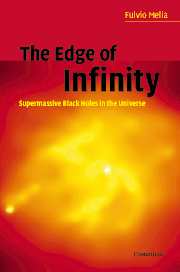3 - The black hole spacetime
Published online by Cambridge University Press: 11 August 2009
Summary
Settling on the banks of the Tiber river, the Latini would establish a city in the seventh century BC that later came to dominate much of the civilized world. They used the word gravis to denote heavy or serious, and the corresponding noun gravitas for heaviness and weight. Our modern word gravity, and its more precise derivative gravitation, trace their roots to this early usage, which itself is linked to a yet older root that includes the Sanskrit guru (for weighty or venerable), among others. The ancients were evidently quite aware of this ever-present property of matter – that it should have an unwavering attraction toward the Earth – though up to the time of Galileo and Newton, gravity simply remained a name for the phenomenon, without any explanation or even an adequate description.
THE INEXORABLE FORCE OF GRAVITY
Toward the end of the seventeenth century, attempts to account for the behavior of objects changing their motion in response to external influences were primarily concerned with the nature of forces that one could easily identify. In the story of Goliath's slaying, for example, the stone was dispatched toward his forehead after David released the sling. Prior to that moment, the diminutive combatant was able to restrain the motion of the stone with a force applied by his hand mediated through the string. Newton argued that the Earth must itself be exerting an attractive force on matter since everything falls down in the same direction.
- Type
- Chapter
- Information
- The Edge of InfinitySupermassive Black Holes in the Universe, pp. 34 - 62Publisher: Cambridge University PressPrint publication year: 2003

